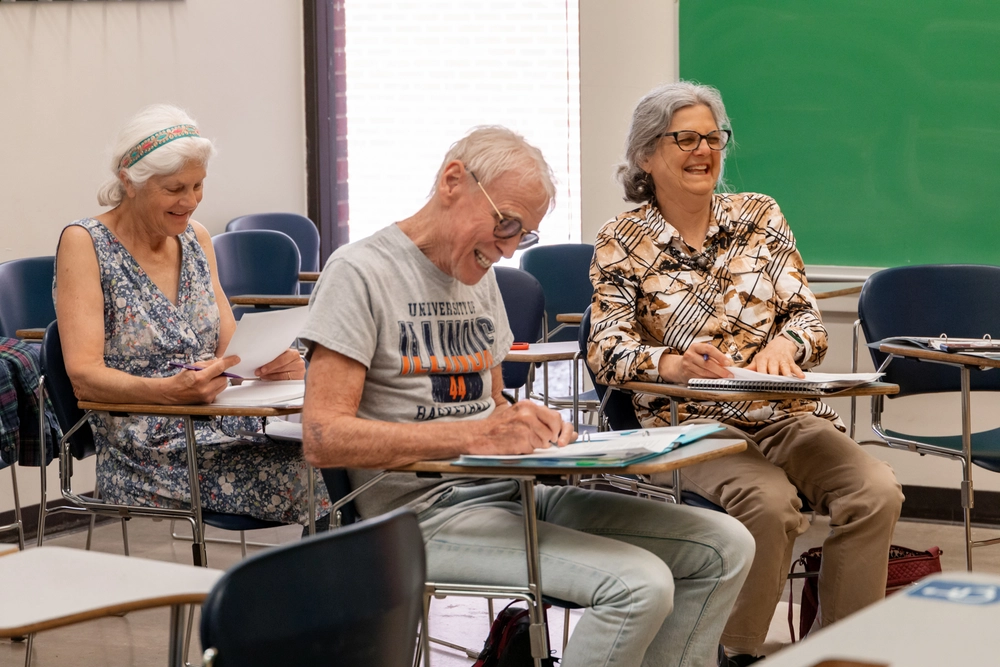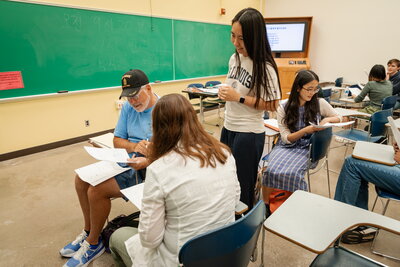
Learning a language can seem daunting, especially if you’ve been out of the classroom for a while.
A newly returned language program is easing some of that uncertainty by helping students from all walks of life take that first step.
The Intensive Language Instruction Program (ILIP)—formerly known as the Intensive Foreign Language Instruction Program, or IFLIP—returned this summer 2024 after a hiatus due to the pandemic. The program is designed to accelerate language learning through an immersive classroom atmosphere. Students receive 30 hours of instruction, maximizing exposure to their target language to help them meet their learning goals. The program, which ran from May 13-24, was open to both members of the university community and to the public.
“It is the perfect way to begin a language you’ve always wanted to learn or to better communicate in a language with which you are already familiar,” said Jude Krushnowski, director of ILIP and the World Teacher Education Program.
Katie VanDyne (PhD, ’24, Spanish linguistics) is no stranger to language learning. She’s starting as a professor of Spanish at Truman State University in Missouri this August but found herself with some extra time in the interim. She decided to fill the gap by taking Italian through ILIP.
“I love learning new languages, but even as a linguist I find it challenging to begin a new language and stay motivated completely on my own or with an app,” VanDyne said. “ILIP seemed like a great opportunity to jump into learning something new in a guided yet low-pressure setting.”

Along with Italian, this year’s program offered classes in Arabic, French, German, Korean, Mandarin Chinese, Modern Greek, and Spanish. There were also intermediate classes in Mandarin Chinese and Spanish and an advanced section of Spanish.
Laura Jean Poulosky (MA, PhD, ‘01 French literature; MS, ’07, library and information science) has a long history with the program. She co-taught a session of intermediate French and first took beginner Chinese through the program two decades ago.
Poulosky said the initial draw to the program was a personal one, but there’s one key aspect that keeps her coming back: “My husband and I adopted our daughter from China nearly 20 years ago, and I’ve been interested in improving my Chinese ever since. I enjoy studying languages and love the opportunity that this program gives me to study languages with other interested students. I appreciate that all the students are there purely to learn, not just to earn credits or high grades.”
Classes are designed to be fun, welcoming, and low stress, with minimal homework, no attendance policy, and no academic credit. While the content of each course varies, the focus is on conversational skills, travel preparation, and language survival skills.
“This is not [your typical] travel survival class, i.e. not just a collection of useful phrases, but a real class in basic Spanish, perhaps equivalent to 10 weeks of college level Spanish 101,” said John Abelson, a retired professor of materials science and engineering and beginner Spanish student.
While the classes themselves are accelerated, Krushnowski hopes the impact of the program will be long-lasting.
“I hope ILIP will help build bridges within our community by bringing people together to deepen their understanding of different languages and cultures,” he said. “Champaign-Urbana is a profoundly diverse place, and I would like to see ILIP promote an appreciation for multiculturalism and multilingualism. In my opinion, there is nothing quite as humbling and empowering as learning another language.”
VanDyne said that diversity is what made her classroom experience so enjoyable.
“The mix of different backgrounds, experiences, and perspectives helped to cultivate a very interesting learning environment and one that you don’t always find in more traditional courses,” she explained. “This is a unique opportunity that I feel we are lucky to have on our campus. The instructors are excellent and create a welcoming environment for all. You can start with no prior knowledge of the language, and you will be surprised at how much you can easily pick up in only two weeks…and you’ll have a lot of fun, too!”
Editor's note: This story first appeared in the School of Literatures, Cultures & Linguistics fall 2024 newsletter. To stay up to date on the 2025 Intensive Language Instruction Program, check back here.